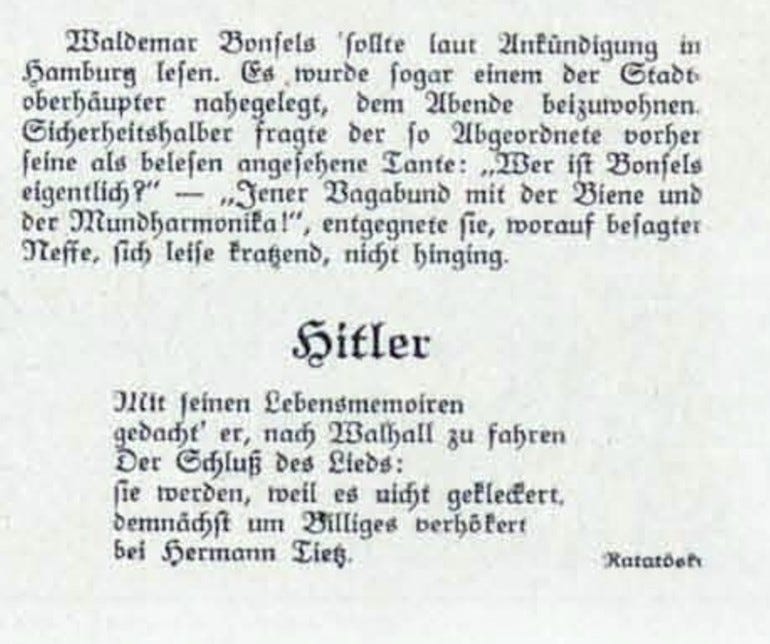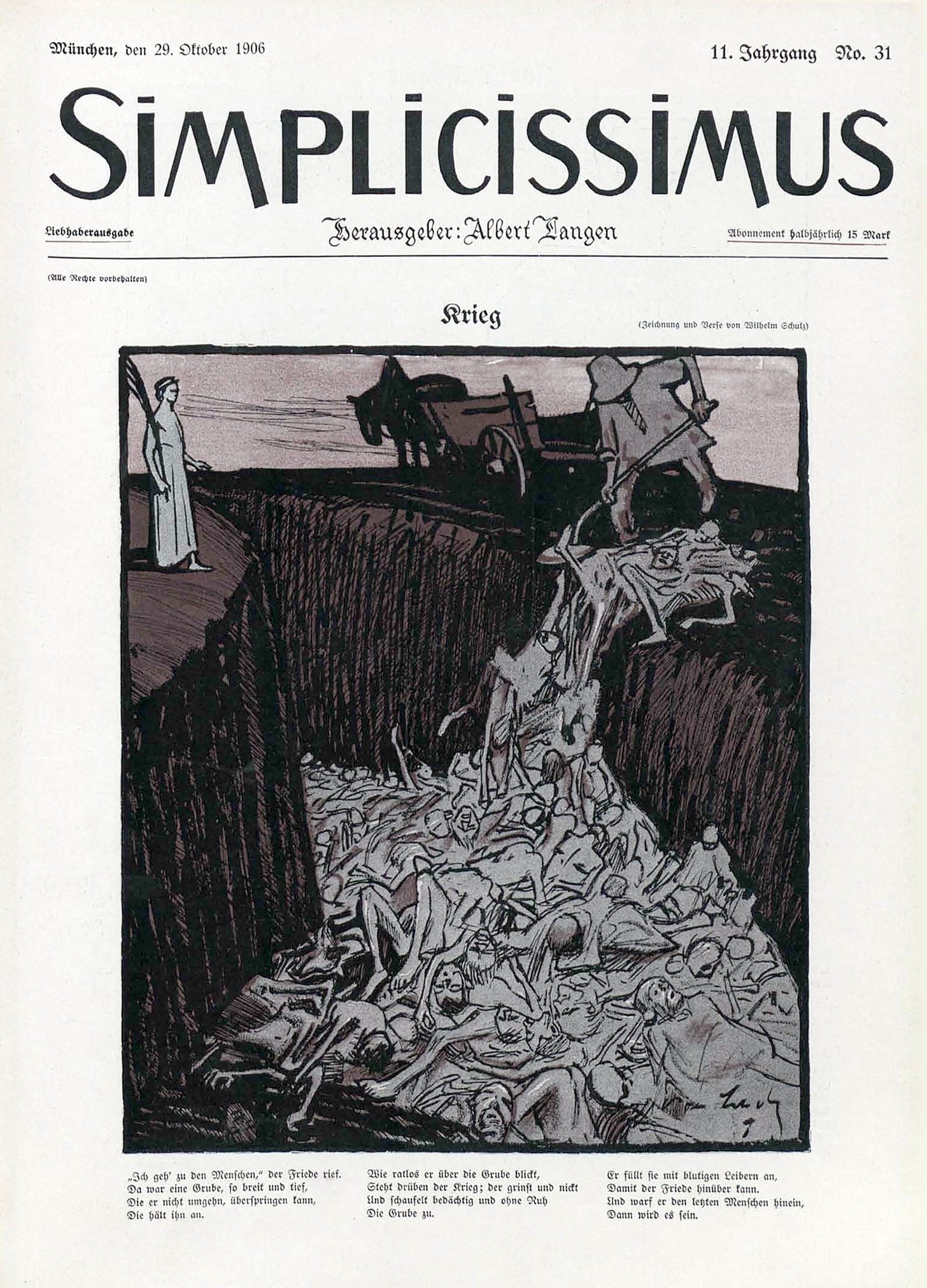Political Humor
Jokes formed a release valve of sorts for those who put everything on the line for liberty and justice for all. Without the ability to make fun of their corrupt regime, they could not have kept going.

Much of our work revolves around serious, unfunny content. There is nothing slightly humorous about the brutality and inhumanity that became part of the warp and woof of German society from 1933-1945. Primary source materials generally give me nightmares.
And yet: The topic of Humor as Informed Dissent occasionally reappears on my radar. My interest in the topic began as a TCU senior, researching Ludwig Thoma and his merry band of fellow writers who disparaged the Kaiser in print. Occasionally they would find themselves in a Munich prison, cooling their heels until they were released… to write more satirical essays and plays.
Initially these Simplicissimus writers ridiculed a rising political star named Adolf Hitler. In the December 14, 1925 issue of the magazine, Hans Erich Blaich writing under the pseudonym Ratatöskr published the following ditty, entitled simply Hitler:
Mit seinen Lebensmemoiren
gedacht’ er, nach Walhall zu fahren
Der Schluβ des Lieds:
sie werden, weil es nicht gekleckert,
demnächst um Billiges verhökert
bei Hermann Tietz.
Or, in English,
With his memoirs
he thought he’d go up to Valhalla
Last line of the song:
Because they didn’t go over big, they’ll
be sold at a discount very soon
by Hermann Tietz.
Since Hermann Tietz was the German-Jewish founder of the department stores called Hertie post-Aryanization, Blaich mocked Hitler on two levels.
Humor As Informed Dissent did not cease in January 1933, when Hitler ascended to power. During the war, comedians like Karl Valentin and Weiβ-Ferdl subversively poked fun at Hitler and National Socialism, even while hanging out with the people they derided. (Think Rachel Maddow hanging out with David Duke to grasp the enormity of that inconsistency.)
Regardless of their motivation, these comedians provided fodder and encouragement for Germans engaged in resistance activities. We know, for example, that much of the wonderfully seditious farewell party at Eickemeyer’s studio in July 1942 was occupied with the telling and re-telling of jokes the White Rose friends had heard around town.
Hans Scholl related a tale about a house that had been destroyed in an air raid. An unknown person had installed a placard that read: Führer, wir danken Dir!, or Führer, we thank you! And then there was the house where someone had painted Sieg Heil (Hail Victory) as a symbol of their patriotism. An unknown prankster had added a question mark behind the “patriotic” slogan.
Edwin Swineford of Fresno, California collected 651 pages of World War II era jokes, including American, British, French, Soviet, and German humor from those awful twelve years. It is difficult to choose favorites, as often the humor was purposefully dry, vague, or bitter. But below are five that stand out, all German.
“Ja, ja, ja,” sighed one Hamburg dockworker to another. After a long pause, he repeated, “Ja, ja, ja.” - “Listen,” said his friend, “can’t you for one moment stop talking about politics?”
What is the difference between Christianity and National Socialism? - In Christianity, one man died for all. In National Socialism, all die for one man. — Note that there are probably a dozen variations of this joke.
Heard in prison: “I see now I was mistaken. I said I owed allegiance to my country, not to the party.”
Hitler dies and is ushered into the afterlife. While he is waiting for his assignment - heaven or hell - he spies a Jewish man in paradise. Clearly annoyed, he asks St. Peter, “What is that Jew doing in heaven, not wearing a yellow Star of David?” — St. Peter puts his fingers to his lips. “Keep your voice down. That’s the boss’s son.”
The Führer visits a mental institution. All the patients were ordered to line up in a row and were taught how to properly salute the Führer. When Hitler appeared, they all shouted, “Heil Hitler!” Except for one person in the back row. — Hitler was furious. “Don’t you know who I am? Why don’t you raise your hand, you lunatic?” — “I beg your pardon,” replied the man politely, “I am the doctor. I am not a lunatic.”
These jokes and double entendres formed a release valve of sorts for the men and women who put everything on the line for liberty and justice for all. Without the ability to make fun of their corrupt regime, even as they wrote words encouraging sabotage and resistance, they could not have held on or kept going.
Although our work shines a spotlight on the serious side of the lives of freedom fighters, we should remember that they had the capacity for living outside the boundaries of heavy contemplation. We should celebrate their entire humanity, not merely the parts we deem noble.
After all, it was also Simplicissimus that carried the following political cartoon, not funny in the least. But terribly prescient.
The poem beneath the “cartoon” reads:
“I am going to the people,” Peace calls.
There was a pit, so deep and wide,
Peace could not go around, could not jump over,
It blocked his way.
No matter how helplessly Peace looked over the pit,
War was always on the other side, grinning and nodding
And deliberately shoveling, never resting,
Into the pit.
War filled that pit with bloody corpses,
So Peace could pass over to the other side.
Once War has thrown the last corpse into the pit,
Then and only then will it be.





